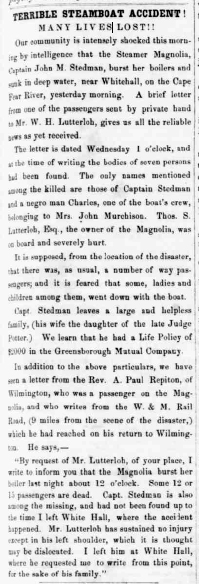16 July 1816–15 July 1900

Thomas S. Lutterloh, commission merchant, steamboat owner, turpentine distiller, and political leader, was born in Chatham County. Little is known about his family or education except that as a youth he moved to Fayetteville and lived for several years with James Kyle, a merchant. Subsequently he clerked in the store of Charles T. Haigh until he entered the mercantile business for himself about 1840. In the two decades before the Civil War, Fayetteville, at the head of navigation on the Cape Fear River, and with a network of plank roads radiating from it, increased in importance as a trading center. Goods brought upriver from Wilmington by steamboat were forwarded in covered wagons to merchants in the Piedmont and western regions of the state. Lutterloh operated a local store and a commission and forwarding business specializing in heavy commodities, such as Swedish iron, salt, brown sugar, and molasses.
He soon entered the river transportation phase of the business and was reputed to have been the first man in Fayetteville to become sole owner of a steamboat. In 1847 he was one of the organizers and chief promoters of the Merchants Steamboat Company. In about 1850, when the naval stores industry began to develop in the upper Cape Fear region, Lutterloh built and operated the first turpentine distillery in Fayetteville. By 1853 his interests included a store and forwarding agency, distillery, cooper's shop, drayage service, and major steamboat line on the river. With a total of four boats, he inaugurated daily service between Fayetteville and Wilmington. Two years later he participated in the organization of the Bank of Clarendon. With fifty-nine slaves, he was the largest slaveholder in Fayetteville in 1860. The Civil War brought the destruction of his steamboat line and the end of slavery. Unable to recoup these losses, he adjusted his business interests to changing times and became one of the largest cotton merchants in the area.
Lutterloh also played a role in local and state politics. He was appointed a town commissioner in the 1840s, and when the office became elective in 1847, he was elected from Ward 6. Originally a member of the Whig party, he was elected mayor on the American, or Know-Nothing, party ticket, serving from 1855 to 1857. By 1860 he was prominent in the movement to organize a "Southern Rights" party for the defense of the South. During the Civil War Lutterloh served on various committees concerned with the welfare of Fayetteville and its people. In the postwar period he became a leader in the Republican party and served in the House of Commons in 1866–67, 1872–74, and 1879–1880.
Contemporaries regarded Lutterloh as an eminently successful businessman, "honest, fearless, . . . very quiet in all his ways, but determined in all his acts." In his later years he was addressed with the honorary title of "Colonel." An Episcopalian, Lutterloh married Mary Frances Buxton, daughter of the Reverend Jarvis B. Buxton, rector of St. John's Episcopal Church (1831–51), and they had nine children: Jarvis B., Harriet Ann, Thomas C., Ralph B., Frances, Edward, Elizabeth, Anna, and Herbert. He died from the infirmities of advanced years and was buried in Cross Creek Cemetery.